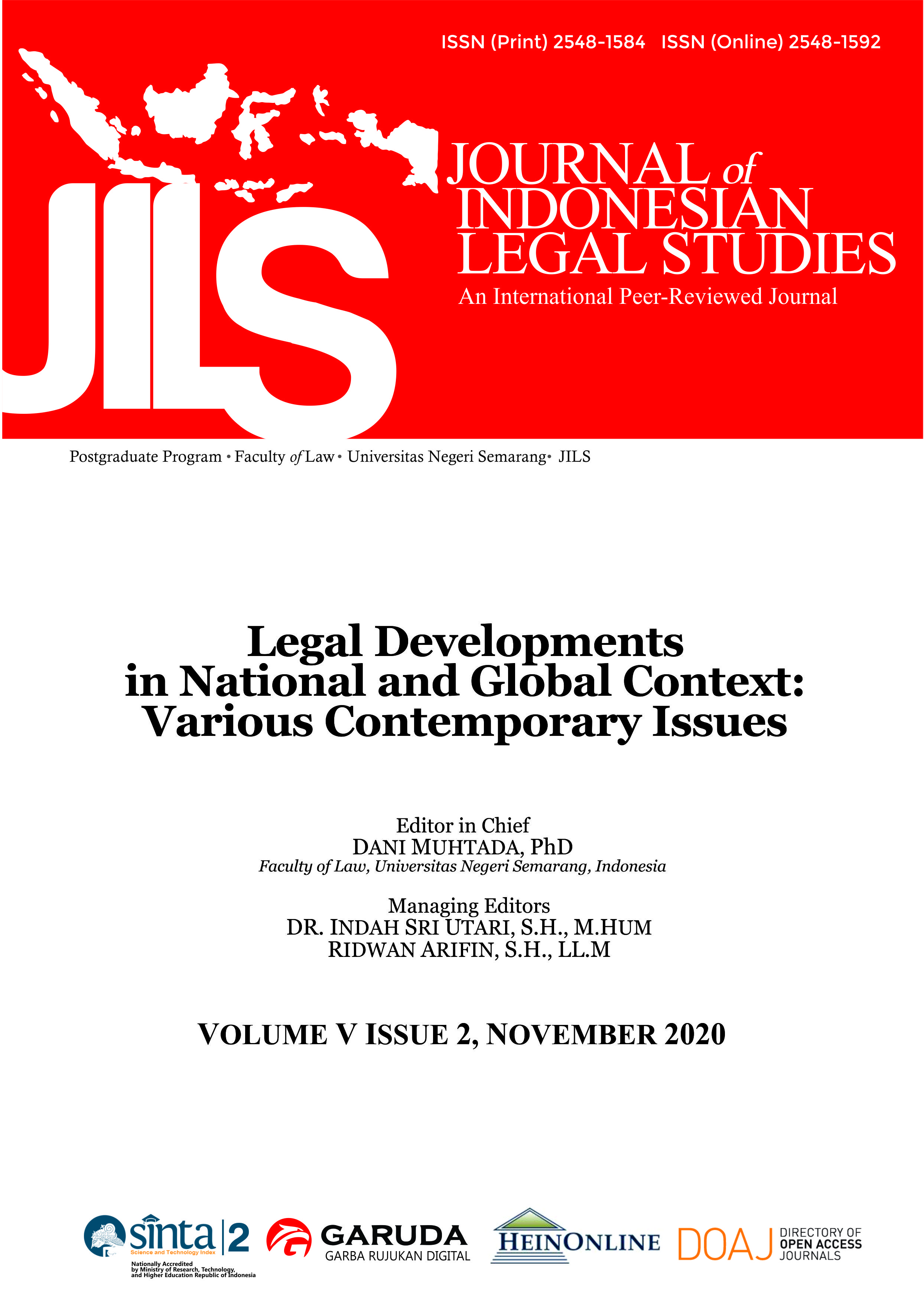Discourse on Legal Expression in Arrangements of Corruption Eradication in Indonesia
Main Article Content
Abstract
The purpose of this research is to explain and examine the expansion of the absolute competence of the Administrative Court (hereinafter referred to as PTUN) after the Government Administration Law is promulgated and the implications of the application of the Administrative Law on legal certainty to eradicate and enforce corruption in Indonesia. This research uses a normative juridical research method and uses a statutory approach (statute approach). The results showed "that there are several forms of expansion of PTUN competencies, such as the authority that acts factually, the authority, administrative authorization, decide on positive fictitious decisions, and discretionary trials". Meanwhile, the implications of the Government Administration Law on corruption are known as corruption crimes, which are true. So, in this context, there are at least two problems, namely: “1. If the authorized court case is carried out by the state government which is submitted to the court simultaneously, to the State Administrative Court and to the District Court in a corruption case? 2. If at any time a PTUN decision has been issued stating that it is not authorized, but there is also a party who submits the case to the District Court on charges of corruption. What is the attitude of the District Court, whether to accept the PTUN decision on the case or choose to override the PTUN decisionâ€. So the author is of the view that in this case there is concern that it will complicate the prosecution or eradication of criminal acts of corruption in the case of abuse of authority committed by government officials.
Article Details

This work is licensed under a Creative Commons Attribution-ShareAlike 4.0 International License.
All writings published in this journal are personal views of the authors and do not represent the views of this journal and the author's affiliated institutions. Author(s) retain copyrights under the licence of Creative Commons Attribution-ShareAlike 4.0 International (CC BY-SA 4.0).
References
Buana, M. S. (2010). “Hubungan Tarik-Menarik Antara Asas Kepastian Hukum (Legal Certainty) Dengan Asas Keadilan (Substantial Justice) Dalam Putusan-Putusan Mahkamah Konstitusiâ€, Thesis, Yogyakarta: Universitas Islam Indonesia.
Elpah, D. (2016). Titik Singgung Kewenangan Antara Pengadilan Tata Usaha Negara dengan Pengadilan Tipikor dalam Menilai Terjadinya Penyalahgunaan Wewenang, Jakarta: Puslitbang Hukum dan Peradilan MA.
Hadjon, P. M. et.al. (1993). Pengantar Hukum Administrasi Indonesia. Yogyakarta: UGM Press.
Hadjon, P. M. et.al. (1999) Pengantar Hukum Administrasi Indonesia (Introduction to the Indonesian Administrative Law), Cetakan Keenam. Yogyakarta: Gadjah Mada University Press.
Jaya, N. S. P. (2008). Beberapa Pemikiran ke arah Pengembangan Hukum Pidana. Jakarta: Citra Aditya Bakti.
Marbun, S.F. (1997). Peradilan Administrasi Negara dan Upaya Administrasi di Inodnesia,.Yogyakarta: Liberty.
Permana, T. C. I. (2016). Catatan Kritis terhadap Perluasan Kewenangan Mengadili Peradilan Tata Usaha Negara. Yogyakarta: Genta Press.
Republic of Indonesia. (2015). Peraturan Mahkamah Agung RI No. 4 Tahun 2015 Tentang Pedoman Beracara Dalam Penilaian Unsur Penyalahgunaan Wewenang.
Republic of Indonesia. (2016). Putusan Mahkamah Konstitusi Nomor 25/PUU-XIV/2016.
Ridwan, H.R. (2009a). Tiga Dimensi Hukum Administrasi dan Peradilan Administrasi, Cetakan Pertama, Yogyakarta: UII Press.
Ridwan, H.R. (2009b) Hukum Administrasi di Daerah, Cetakan Pertama, Yogyakarta: UII Press.
Ridwan, H.R. et. al. (2018). Perluasan Kompetensi Absolut Pengadilan Tata Usaha Negara dalam Undang-Undang Administrasi Pemerintahan, Jurnal Hukum Ius Quia Iustum, 25(2), 339-358.
Saputra, R. (2020). Development of Creative Industries as Regional Leaders in National Tourism Efforts Based on Geographical Indications. Jurnal Bestuur, 8(2), 108-120.
Suhariyanto, B. (2018) Persinggungan Kewenangan Mengadili Penyalahgunaan Diskresi Antara Pengadilan TUN dan Pengadilan Tipikor, Jurnal Hukum dan Peradilan, 7(2), 213-236 .
Susanti, I. (2014). Refleksi Ilmu Hukum dalam Analisis Penegakan Hukum Pemberantasan Korupsi di Indonesia, Jurnal Dinamika Hukum, 14(1), 123-133/
Wahab, S. A. (2011). Analisis Kebijakan: Dari Formulasi Ke Penyusunan Model Model Implementasi Kebijakan Publik. Jakarta: Bumi Aksara.
Wahyunadi, Y. M. (2016). “Kompetensi Absolut Pengadilan Tata Usaha Negara dalam Konteks Undang-Undang Nomor 30 Tahun 2014 Tentang Administrasi Pemerintahanâ€, Dissertation, Jakarta: Universitas Trisakti.
Widodo, J. (2001). Etika Birokrasi dalam Pelayanan Publik. Malang: Citra Media.
Widodo, J. (2004). Membangun Birokrasi Berbasis Kinerja. Malang: Banyumedia.
Wiyono, R. (2007). Hukum Acara Peradilan Tata Usaha Negara, Cetakan Peratama. Jakarta: Sinar Grafika.
